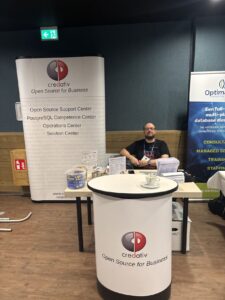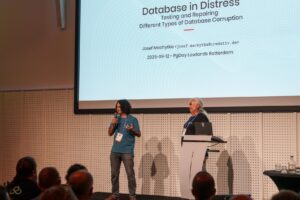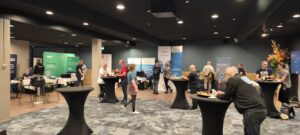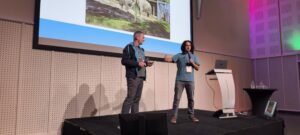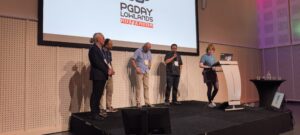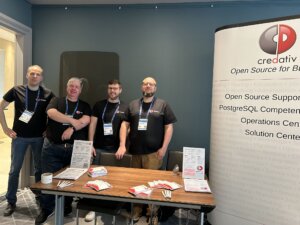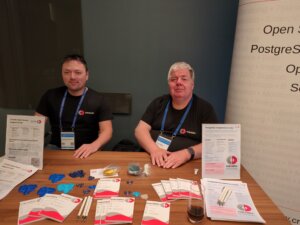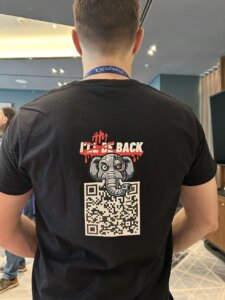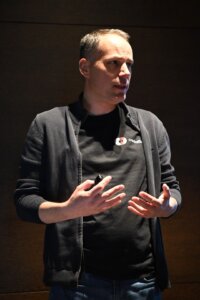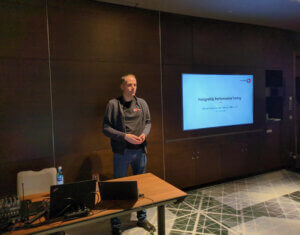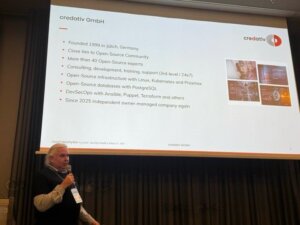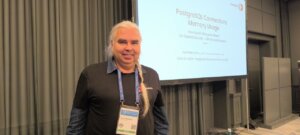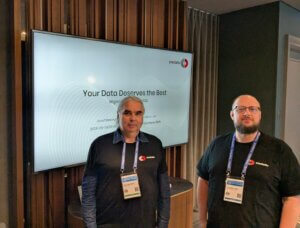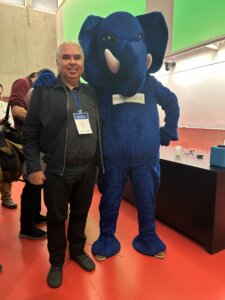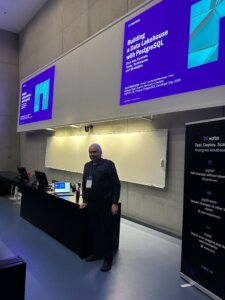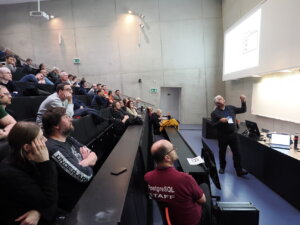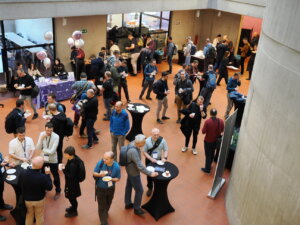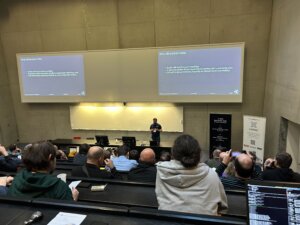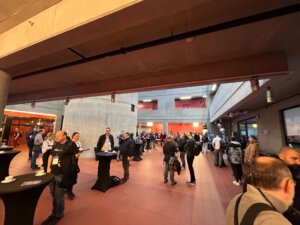Save the Date: On September 24, 2026, we are bringing the Proxmox world together in Mönchengladbach. With Proxday 2026, we are creating an event that goes far beyond our previous formats. While our Virtualization Gathering and Business Breakfast have already provided valuable insights, it is now time for the ‘Next Level’. We are dedicating an entire day to Proxmox VE, finally giving the community the space it deserves – for deep dives, exchange of experiences, and technical innovations.
Proxday is organized by credativ GmbH and is intended as a meeting point by the community for the community. The focus here is on practical exchange of experience, in-depth technical knowledge, and networking among experts. To ensure the program reflects the full spectrum of the Proxmox world, we invite you to actively contribute to shaping the day.
Call for Papers: Share Your Expertise!
The Call for Papers (CfP) is now officially open. We are looking for exciting presentations, technical deep dives, and practical experience reports. Whether you have built a complex infrastructure, developed automation solutions, or successfully migrated to Proxmox – the community benefits from your knowledge.
Possible topics for your submission:
- Proxmox VE & Storage: Best practices for Ceph, ZFS, and high availability.
- Automation & IaC: Proxmox management with tools like Ansible or Terraform.
- Backup Strategies: Use of Proxmox Backup Server in enterprise environments.
- Networking & Security: SDN implementations and security concepts.
- Migration: Strategies and case studies for switching from other hypervisors.
The submission deadline for the Call for Papers is June 30, 2026.
Event Overview
We have chosen the Hotel Palace St. George in Mönchengladbach as the venue. With its combination of classic architecture and modern amenities, the hotel provides the perfect setting for a focused conference and intensive exchange.
- When: September 24, 2026
- Where: Mönchengladbach (Hotel Palace St. George)
- What: A day full of expert presentations, networking, and community exchange around Proxmox.
Join us now
Take the opportunity to present your projects to an expert audience or to get early information about the event. All details about the Call for Papers and the venue can be found on the official event website.
We look forward to welcoming the Proxmox community to Mönchengladbach in September 2026!
👉 Click here to go directly to the CfP on www.proxday.de
Virtualization & “Rhenish Caviar”: Invitation to a Business Breakfast at credativ on March 19, 2026
Tired of license jungles and complex “black boxes”? Or have you heard of Proxmox but haven’t had the time to take a closer look at it without sales pressure?
We cordially invite you to a relaxed Business Breakfast on March 19, 2026, at our location in Mönchengladbach. Whether you are new to virtualization or an experienced IT admin looking for a genuine open-source alternative – with us, there are no dry slide presentations, but rather real live demos, honest exchange, and excellent coffee.
What to Expect
- 09:30 AM | Arrival & Caffeine Check Grab a coffee, settle in, and get to know the other participants.
- 10:00 AM | Demo 1: Proxmox for Beginners and Switchers In 15 minutes, we will show you the interface and the most important features. You will see: virtualization doesn’t have to be complicated. We will alleviate any apprehension and show you why switching is easier than you think.
- 10:20 AM | Demo 2: The Proxmox Ecosystem – More Than Just a Hypervisor What else is possible? We will take a look at ProxLB, Pegaprox, and automation. In 15 minutes, we will show you how to get the most out of the system.
- 10:40 AM – 12:00 PM | Open Discussion & Q&A The rest of the morning is yours. Ask questions, talk shop, or simply enjoy the refreshments.
The Buffet: Fuel for IT Decision-Makers
Good ideas need energy. That’s why we provide suitable catering:
- Freshly brewed coffee & cold beverages.
- A selection of fresh rolls.
- The Highlight: Authentic “Rhenish Caviar” (for those not from the Rhineland: fresh Mettbrötchen with onions). Don’t worry, vegetarian alternatives are also provided!
All Key Details at a Glance
- When: March 19 | 09:30 AM – 12:00 PM
- Where: credativ GmbH, Hennes-Weisweiler-Allee 23, 41179 Mönchengladbach
- For Whom: From IT decision-makers to curious beginners – everyone is welcome.
Registration & Details
So that we can plan the Mett production and roll logistics, please register briefly via our event page:
👉 Register here: https://luma.com/gvxo673b
We look forward to a relaxed morning and engaging conversations with you!
Review of the Dutch Proxmox Day 2025
On September 25, 2025, we attended the Dutch Proxmox Day 2025 in Ede (Netherlands) – and I must say: the event was a complete success. Organized by Tuxis B.V. at the Hotel Belmont in the Veluwe region, the day offered an excellent mix of expert presentations and valuable exchange.
Thanks to the Hosts
A heartfelt thank you to the Tuxis team: For the invitation as a speaker, for the trust placed in us, and for the perfect organization. Yes — this blog article is coming a bit late, but as they say: better late than never.
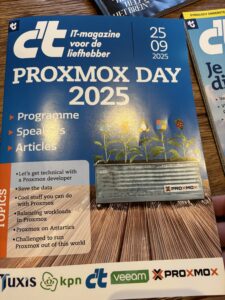
My Perspective as a Speaker
As a speaker, I had the pleasure of being part of an exciting program. At the same time, I was a participant: both at the same time – that’s what makes such days special. I would like to highlight a few presentations:
- Aaron Lauterer (Linux Software Developer at Proxmox Server Solutions) – “Let’s get technical with a Proxmox developer”: A look at upcoming features of Proxmox VE. The upcoming integration of OCI containers (aka Docker) is particularly exciting.
- Rob Turk (Senior Presales Systems Engineer at Veeam) – “Save the data”: Clearly shows that Proxmox has now arrived in the enterprise world.
- Mark Schouten (CTO at Tuxis) – “Cool stuff you can do with Proxmox”: Proxmox Backup Server in interaction with ZFS, how to make the whole thing more performant and what unexpected problems with SCSI and Western Digital have occurred, Mark Schouten told us about it
- Alexander Wirt – “Balancing workloads in Proxmox”: My own contribution with a focus on the project ProxLB of my esteemed colleague Florian Hoberg, which distributes virtual machines evenly across nodes, again shows the advantages and OSS and open interfaces. These make it easy to add missing functionality and thus compete with the industry giants.
- Robbe Van Herck (Support & Maintenance Engineer at International Polar Foundation) – “Proxmox on Antarctica”: Proxmox in extreme use – at the other end of the world and very far from everyday data center life. Robbe was able to show well that Proxmox also works in the most remote corners of the earth, the other challenges are more exciting here – such as hardware that is overwhelmed by the low temperatures.
- Han Wessels (Operations System Engineer at ESA) – “Challenged to run Proxmox out of this world”: Why Proxmox can also be operated on the ISS or in space – technology meets vision. Han vividly described the challenges that arise, such as the vibration during the launch of the carrier rocket or the radiation that significantly shortens the lifespan of storage.
I was able to take away many impulses – both technically and ideally. And I had good conversations that will certainly pay off further.
Networking & Exchange
The informal part was just as valuable as the program: during the breaks, at lunch or at the get-together in the afternoon, we made new contacts, gained interesting insights and met old acquaintances. It is precisely these moments that make a conference come alive.
Outlook
We are already looking forward to next year. When the Tuxis team calls again, we will be happy to be there again. Many thanks again to all those involved, all speakers and all participants – see you again. In between, this December there will be the first Open Source Virtualization Gathering at our company.
The third annual PGDay UK was (again) held at the Cavindish Conference Center in London this year, and I participated for the first time with an updated English version of my PGConf.DE talk, “PostgreSQL Performance Tuning”.
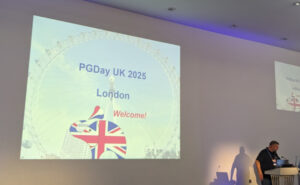
The conference is a one-day, one-track event with an auditorium and a sponsor hall for breaks. Around 75 visitors participated in this year’s conference.
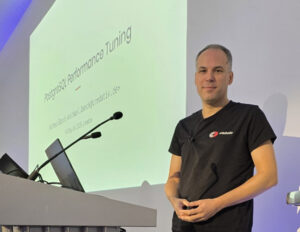
After the welcome session, the first talk was by Bruce Momjian on “Future Postgres Challenges” – a thoughtful compilation on the current status and possible future challenges for Postgres. It looks like the project is currently healthy, and some of the cautionary tales he cited from other open source projects (CentOS, GCC fork, etc.) probably will not apply to Postgres, at least not for a long while. He also mentioned some technological challenges however, and this part (especially attracting young talent to a C code base) looks more worrisome.
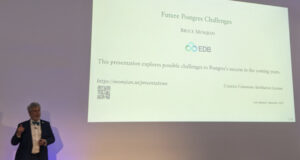
Besides the talks, there were also ample discussions with the participants, sponsors and other speakers. I had long discussions with Michael Christofides from pgMustard about his Postgres.FM podcast, and with our ex-colleague Robert Treat, besides others.
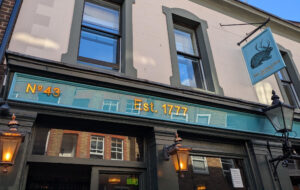
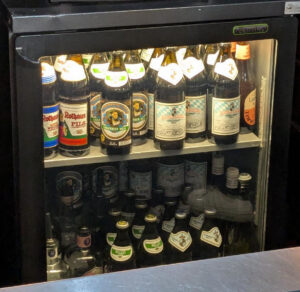
After the conference, some of the participants moved over to a nearby pub for beers and further socializing. Many of the speakers, sponsors and organizers travelled onwards the next day to PGDay Lowlands, which took place later in the week in Rotterdam (see our report from that event here). All in all, this was a very successful (albeit smallish) event.
On Friday, September 12th, we attended PGDay Lowlands 2025 in Rotterdam and it was definitely a conference to remember. It took place at the Blijdorp Zoo in Rotterdam, in the Oceanium building. It was an unforgettable experience to discuss databases while surrounded by various fish, sharks, and rays. Our company credativ GmbH, as an enterprise-grade open-source support provider for PostgreSQL, was a sponsor of the event and we had a booth there to meet attendees. Our CTO Alexander Wirt and our PostgreSQL expert Joop Boonen met visitors on our booth and discussed with them many technical aspects of PostgreSQL.
My Talk about Database Corruption
I represented our company also as a speaker, giving a talk titled “Database in Distress: Testing and Repairing Different Types of Database Corruption.” This talk summarized my experiences with database corruption. I’ve seen many corruption issues while repairing live systems. So I built a Python corruption simulator, which surgically damages selected parts of a data block in a testing table, and I used different PostgreSQL extensions to analyze these cases. The talk walked through examples of page-level corruption and discussed strategies for recovery. At the end of my talk, I discussed potential new Postgres features or settings that could make repairs less painful in the future. After the talk, many attendees came to our booth to discuss their experiences with specific corruption cases, which also sparked greater interest in credativ’s services.
Other Talks and Highlights
- Opening remarks – Boriss Mejias, as the organizer and guide, opened the conference by emphasizing the value of the community around PostgreSQL. Personally,
- Jimmy Angelakos – “How Do We Get Postgres to the Next Level?”
This talk was inspired by the one given by Simon Riggs in December 2023 in Prague. Jimmy offered different insights to keep improving PostgreSQL by making it more modular, boosting test coverage, creating a team specialized only in performance issues, and adding some new cutting-edge features. In particular, he mentioned goals like 100% regression testing, online major-version upgrades, and optional multi-threading – all part of a roadmap to solidify PostgreSQL’s lead. - Gulçin Yıldırım Jelinek – “Anatomy of Table-Level Locks in PostgreSQL”
This was an intermediate deep dive into DDL locks: explaining Access Share, Exclusive, Access Exclusive locks, and how they queue during ALTER or DROP commands. She showed how to interpret lock waits and deadlocks, and shared practical tips (like using online schema-change tools) to achieve near-zero downtime during migrations. - Chris Ellis – “Fun With UUIDs“
I very much enjoyed this talk. UUIDs have a bad reputation, mostly because randomly allocated UUIDs negatively affect indexes. But UUIDs also give us 16 bytes of space to play with, which can be to our advantage. Chris showed how to use the space of UUIDs to structure and encode data within identifiers to distinguish tenants, shards, or partitions. - Johannes Paul – “Actual trees, not b-trees – how I found PostgreSQL through PostGIS”
Speaker charmed the auditorium with the story of a neighbor’s climate-monitoring project mapping real-life tree data across Germany. Because he needed efficient geographic searches, Johannes switched to using PostGIS on PostgreSQL for his web app. - Dirk Krautschick – “Beyond Postgres – Insights about the PostgreSQL Extensibility”
Dirk emphasized that Postgres is designed to be lightweight yet powerful via extensions. He explained the extension framework and sketched out how to write a new extension for extra functionality. - Andreas Scherbaum – “What I learned interviewing the PostgreSQL Community”
I enormously enjoyed this talk . Andreas has been running the postgresql.life interview series and distilled some fun stats from them. It was a charming “state of the community” talk with interesting charts and quotes. - The final debate on “Autotuning in Postgres” was also very interesting. The PRO side (Luigi Nardi, Gianni Ciolli) argued that autotuning tools can save DBAs hours of manual work. But the CON side (Mayuresh S. Bagayatkar, Guy Gyles) countered that blindly auto-changing settings might over-tune and even hurt performance, since machines lack the human context for every deployment and current AI has no concept of truth.
Reflections
PGDay Lowlands 2025 was a fantastic experience. The mix of deep technical content and the relaxed zoo setting made for a friendly, engaging atmosphere. It was great to meet so many users and contributors and to hear about real-world problems, and even pick up new ideas for future work. I’m proud that credativ could play a role in such a great community event. PostgreSQL continues to grow and evolve, with people thinking hard about different issues, from locks and extensions to automatic tuning, and the community’s energy is truly inspiring. We are already looking forward to PGDay Lowlands 2026!
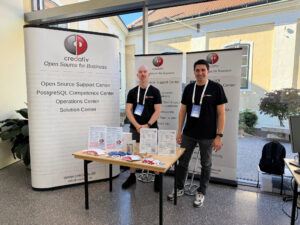 On September 4, 2025, the third pgday Austria took place in the Apothecary Wing of Schönbrunn Palace in Vienna, following the previous events in 2021 and 2022.
On September 4, 2025, the third pgday Austria took place in the Apothecary Wing of Schönbrunn Palace in Vienna, following the previous events in 2021 and 2022.
153 participants had the opportunity to attend a total of 21 talks and visit 15 different sponsors, discussing all possible topics related to PostgreSQL and the community.
Also present this time was the Sheldrick Wildlife Trust, which is dedicated to rescuing elephants and rhinos. Attendees could learn about the project, make donations, and participate in a raffle.
The talks ranged from topics such as benchmarking and crash recovery to big data.
Our colleague was also represented with his talk “Postgres with many data: To MAXINT and beyond“.
As a special highlight, at the end of the day, before the networking event, and in addition to the almost obligatory lightning talks, there was a “Celebrity DB Deathmatch” where various community representatives came together for a very entertaining stage performance to find the best database in different disciplines. To everyone’s (admittedly not great) surprise, PostgreSQL was indeed able to excel in every category.
Additionally, our presence with our own booth gave us the opportunity to have many very interesting conversations and discussions with various community members, as well as sponsors and visitors in general.
For the first time, the new managing director of credativ GmbH was also on site after our re-independence and saw things for himself.
All in all, it was a (still) somewhat smaller, but nonetheless, as always, a very instructive and familiar event, and we are already looking forward to the next one and thank the organizers and the entire team on site and behind the scenes.
This weekend, it was time once again for FrOScon 2025. With perfect summer weather – not too hot, not too cold – the event took place at the university in Sankt Augustin, as it does every year. But this year was different: FrOScon celebrated its 20th anniversary. I have a special connection to the conference. Not only is it the largest local open source conference, but I have also been a part of it for many years. I have given countless presentations, organised Debian stands, and run and organised developer tracks. In 2007, I even had the pleasure of being part of the organising team. In a way, FrOScon is like coming home. Everywhere you look, you see familiar faces you've known for many years, former and current colleagues, good friends from the open source scene. The only comparable event is Fosdem in Brussels – which is not surprising, as Fosdem is the great role model for FrOScon.
A journey through time – 20 years of FrOScon
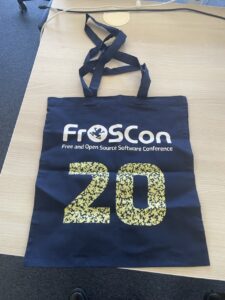
I was already involved in the first FrOScon as an exhibitor for the Debian project, speaker and organiser of the Debian track (together with my colleague Martin Zobel-Helas, who is still involved). I could probably still give the presentation on techniques for combating spam today without changing a word, as the topic has lost none of its relevance. The first FrOScon closed its doors with a very respectable attendance of around 300 visitors. I was so enthusiastic that I got directly involved in the organisation the following year – this was also the year we introduced the famous bouncy castle ;). Over the course of 20 years, FrOScon has developed into one of the largest German OSS community events and now attracts around 1,500 visitors every year. Over the years, the conference has also attracted various prominent keynote speakers, including Andrew Tanenbaum and Richard Stallman, to name but a few. Then as now, I can say that FrOScon is the best conference in the West.
FrOScon 2025
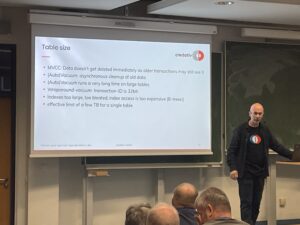
Let's get to the actual content of this blog post – FrOScon 2025. We were represented this year with two presentations and several colleagues as visitors. My colleague Patrick Lauer dedicated one of the rooms to the topic of "Postgres with many data". Thanks to c3voc, the presentation is also available as a stream for anyone who was unable to attend, so everyone can fill this knowledge gap at a later date.
I also gave a presentation again this year. The topic was Proxmox VE and external block devices. I talked about the different types of block devices, such as ISCSI, Fibre Channel and NVMEoF, and how to use them. This presentation is also available in the c3voc video archive.
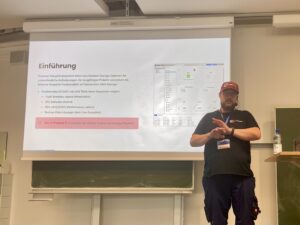
Conclusion
This FrOScon was once again a successful event for community members and interested professionals. It's a bit like a class reunion: you see lots of familiar faces and are excited to find out what everyone has been up to since you last met. Even if I'm hopefully retired by then, I would be delighted to give a presentation at FrOScon #40 ;).
From July 14 to 19, 2025, this year’s Debian Conference (DebConf25) is taking place in Brest, Western France, with over 450 participants – the central meeting of the global Debian community. The DebConf annually brings together developers, maintainers, contributors, and enthusiasts to collaboratively work on the free Linux distribution Debian and exchange ideas on current developments.
credativ is once again participating as a sponsor this year – and is also represented on-site by several employees.
A Week Dedicated to Free Software
DebConf25 offers a diverse program with over 130 sessions: technical presentations, discussion panels, workshops, and BoF sessions (“Birds of a Feather”) on a wide variety of topics from the Debian ecosystem. Some key topics this year:
- Progress surrounding Debian 13 “Trixie”, whose release is currently being actively worked on
- Reproducible Builds, System Integration, and Security Topics
- Debian in Cloud Environments and Container Contexts
- Improved CI/CD Infrastructure and New Tools for Maintainers
Many of the presentations will, as always, be recorded and are publicly available on video.debian.net, or can be viewed live via https://debconf25.debconf.org/.
Credativ’s Commitment – not just On-Site
As a long-standing part of the Debian community, it is natural for credativ to contribute as a sponsor to DebConf again in 2025. Furthermore, our colleagues Bastian, Martin, and Noël are on-site to exchange ideas with other developers, attend presentations or BoFs, and experience current trends in the community.
Especially for companies focused on professional open-source services, Debian remains a cornerstone – whether in data centers, in the embedded sector, or in complex infrastructure projects.
Debian Remains Relevant – both Technically and Culturally
Debian is not only one of the most stable and reliable Linux distributions but also represents a special form of community and collaboration. The open, transparent, and decentralized organization of the project remains exemplary to this day.
For us at credativ, the Debian project has always been a central element of our work – and at the same time, a community to which we actively contribute through technical contributions, package maintenance, and long-term commitment.
Thank You, DebConf Team!
Heartfelt thanks go to the DebConf25 organizing team, as well as to all helpers who made this great conference possible. Brest is a beautiful and fitting venue with fresh Atlantic air, a relaxed atmosphere, and ample space for exchange and collaboration.
Outlook for 2026
Planning for DebConf26 is already underway. We look forward to the next edition of DebConf, which will take place in Santa Fe, Argentina – and to continuing to be part of this vibrant and important community in the future.
PGConf.DE 2025, the 9th Annual PostgreSQL Conference Germany, was held on May 8–9, 2025, at the Marriott Hotel near Potsdamer Platz in Berlin. The event interconnected PostgreSQL enthusiasts, developers, DBAs, and industry sponsors for two days of fascinating talks across four parallel tracks. It was the biggest event so far, with 347 attendees. The whole conference was very well organized, and therefore special thanks are due to all the organizers—in particular Andreas Scherbaum, the main organizer—for their efforts and hard work.
Our company, credativ GmbH, being independent again, participated as a gold sponsor. The credativ CTO Alexander Wirt, Head of Sales & Marketing Peter Dreuw and team leader of Database team Tobias Kauder, were available for attendees at the credativ booth. Many thanks to our team colleague Sascha Spettmann for delivering all the stands and billboards to the conference and back again.
In total, we held four talks at the conference. Michael Banck, technical leader of our database team, presented the German-language talk “PostgreSQL Performance Tuning.” He provided a deep and comprehensive overview of the most important performance-tuning parameters in PostgreSQL and explained how they influence the database’s behavior. His talk attracted a large audience and was very well received.
I had an absolutely unique opportunity to present three different talks in the English track. In my regular talk “PostgreSQL Connections Memory Usage: How Much, Why and When,” I presented the results of my research and tests on PostgreSQL connections’ memory usage. After explaining the most important aspects of Linux memory management and measurements of memory usage reported by standard commands, I detailed PostgreSQL connection memory usage during query execution based on numbers reported in smaps files. I intend to publish detailed blog posts about my findings soon. My other talk, “Building a Data Lakehouse with PostgreSQL,” was originally chosen as a reserve talk in case of a last-minute cancellation. Unfortunately, this indeed happened: the talk “Creating a Board Game Chatbot with Postgres, AI, and RAG” by Matt Cornillon had to be replaced. The speaker could not attend because his flight was unexpectedly canceled at very short notice.
In the sponsor track, credativ CTO Alexander Wirt and I presented a talk titled “Your Data Deserves the Best: Migration to PostgreSQL.” It featured our new migration tool, “credativ-pg-migrator.” It is capable of migrating data models (tables, data, indexes, constraints, and views) from Informix, IBM DB2 LUW, MS SQL Server, Sybase ASE, SQL Anywhere, and MySQL/MariaDB. In the case of Informix, it can also convert stored procedures, functions, and triggers into PostgreSQL PL/pgSQL. We will share more details about this tool in a separate blog post.
Since there were always three or four parallel talks, I had to carefully choose which sessions to attend. I greatly enjoyed the talk “András in Windowsland – a DBA’s (mis)adventures” by András Váczi from Cybertec. The speaker presented many useful tips for accessing and troubleshooting PostgreSQL on Windows. I also enjoyed the German talk “Modern VACUUM,” delivered by Christoph Berg from Cybertec. He provided valuable insights into the history and implementation details of the VACUUM command and autovacuum background processes. Another very interesting talk was the German presentation “Modernes SSL ideal einsetzen” by Peter Eisentraut from EDB. The talk covered selecting appropriate protocol versions and cryptographic cipher suites, managing keys and certificates, and configuring client/server settings to meet contemporary security standards. The talk “Comparing the Oracle and PostgreSQL transaction systems,” delivered by Laurenz Albe from Cybertec, received a lot of well-deserved attention. Key topics included Oracle’s undo/redo mechanism versus PostgreSQL’s MVCC approach, differences in isolation level defaults and anomalies, and how each database implements constraints and transactional DDL. Last but not least, I want to mention the talk “What is an SLRU anyway?” delivered by major PostgreSQL contributor Álvaro Herrera. He explained that SLRUs are essentially circular logs with an in-memory cache used for tracking information such as committed transactions or snapshot data and he highlighted the significance of PostgreSQL 17’s innovations which made SLRU cache sizes configurable. Unfortunately, the talks were not recorded, but slides for the majority of the talks are already available on the conference website.
The whole event was highly informative and provided excellent networking opportunities. We are very much looking forward to participating in the next PGConf.DE. In the meantime, stay tuned to all credativ news, follow us on social media – LinkedIn and Mastodon.
If you are interested in our PostgreSQL related services, click here!
The Prague PostgreSQL Developer Day (P2D2) is a well-established Czech PostgreSQL conference. This year’s 17th edition was exceptional, with 275 registered visitors and 16 talks across two tracks. Notably, several major PostgreSQL contributors and core members were present, underlining the event’s significance. Tomas Vondra, as in previous years, organized the conference. Bruce Momjian, Vice President and Postgres Evangelist at EDB, led a half-day workshop titled “Postgres & AI: From the Trenches to the Sky.” Robert Haas delivered a really interesting talk on Incremental Backup in PostgreSQL 17, a feature he developed.
I had the fantastic opportunity to contribute to this conference with my new talk, “Building a Data Lakehouse with PostgreSQL: Dive into Formats, Tools, Techniques, and Strategies.” Given the still evolving nature of this topic and the varying definitions of data lakehouses, I covered the most important areas, highlighting the functionalities and extensions PostgreSQL offers. I received very positive feedback on my talk and had several insightful discussions about the topic with different people.
Among the talks I attended, I particularly enjoyed Robert Haas’s presentation on Incremental Backups, the practical demonstration of PostgreSQL statistics in the talk “Statistics: How PostgreSQL Counts Without Counting” by Sadeq Dousti, and the very interesting presentation “Anatomy of Table-Level Locks in PostgreSQL” by Gülçin Yıldırım Jelínek. She explained in detail the hierarchy of different locking levels and the events leading to delays in operations due to locks. Other notable talks included “Replicating Schema Changes with PostgreSQL” by Esther Miñano and “When Autovacuum Met FinOps: A Cloud Romance” by Mayuresh Bagayatkar. You can find summaries of all talks and soon also the slides on the P2D2 website. I want to express my gratitude to all the organizers of this amazing event, especially Tomas Vondra and Gülçin Yıldırım Jelínek, who both do a great job in organizing PostgreSQL events not only in the Czech Republic.
DebConf 2024 from 28. July to 4. Aug 2024 https://debconf24.debconf.org/
Last week the annual Debian Community Conference DebConf happend in Busan, South Korea. Four NetApp employees (Michael, Andrew, Christop and Noël) participated the whole week at the Pukyong National University. The camp takes place before the conference, where the infrastructure is set up and the first collaborations take place. The camp is described in a separate article: https://www.credativ.de/en/blog/credativ-inside/debcamp-bootstrap-for-debconf24/
There was a heat wave with high humidity in Korea at the time but the venue and accommodation at the University are air conditioned so collaboration work, talks and BoF were possible under the circumstances.
Around 400 Debian enthusiasts from all over the world were onsite and additional people attended remotly with the video streaming and the Matrix online chat #debconf:matrix.debian.social
The content team created a schedule with different aspects of Debian; technical, social, political,….
https://debconf24.debconf.org/schedule/
There were two bigger announcements during DebConf24:
- the new distribution eLxr https://elxr.org/ based on Debian initiated by Windriver
https://debconf24.debconf.org/talks/138-a-unified-approach-for-intelligent-deployments-at-the-edge/
Two takeaway points I understood from this talk is Windriver wants to exchange CentOS and preferes a binary distribution. - The Debian package management system will get a new solver https://debconf24.debconf.org/talks/8-the-new-apt-solver/
The list of interesting talks is much longer from a full conference week. Most talks and BoF were streamed live and the recordings can be found in the video archive:
https://meetings-archive.debian.net/pub/debian-meetings/2024/DebConf24/
It is a tradtion to have a Daytrip for socializing and get a more interesting view of the city and the country. https://wiki.debian.org/DebConf/24/DayTrip/ (sorry the details of the three Daytrip are on the website for participants).
For the annual conference group photo we have to go outsite into the heat with high humidity but I hope you will not see us sweeting.
The Debian Conference 2025 will be in July in Brest, France: https://wiki.debian.org/DebConf/25/ and we will be there.:) Maybe it will be a chance for you to join us.
See also Debian News: DebConf24 closes in Busan and DebConf25 dates announced
DebConf24 https://debconf24.debconf.org/ took place from 2024-07-28 to 2024-08–04 in Busan, Korea.
Four employees (three Debian developers) from NetApp had the opportunity to participate in the annual event, which is the most important conference in the Debian world: Christoph Senkel, Andrew Lee, Michael Meskes and Noël Köthe.
DebCamp
What is DebCamp? DebCamp usually takes place a week before DebConf begins. For participants, DebCamp is a hacking session that takes place just before DebConf. It’s a week dedicated to Debian contributors focusing on their Debian-related projects, tasks, or problems without interruptions.
DebCamps are largely self-organized since it’s a time for people to work. Some prefer to work individually, while others participate in or organize sprints. Both approaches are encouraged, although it’s recommended to plan your DebCamp week in advance.
During this DebCamp, there are the following public sprints:
- Python Team Sprint: QA work on the Python Team’s packages
- l10n-pt-br Team Sprint: pt-br translation
- Security Tools Packaging Team Sprint: QA work on the pkg-security Team’s packages
- Ruby Team Sprint: Work on the transition to Ruby 3.3
- Go Team Sprint: Get newer versions of docker.io, containerd, and podman into unstable/testing
- Ftpmaster Team Sprint: discuss potential changes in ftpmaster team, workflow and communication
- DebConf24 Boot Camp: guide people new to debian with a focus on debian packaging
- LXQt Team Sprint: Workshop for new commers and work on the latest upstream release based on Qt6 and wayland support.
Scheduled workshops include:
GPG Workshop for Newcomers:
Asymmetric cryptography is a daily tool in Debian operations, used to establish trust and secure communications through email encryption, package signing, and more. This workshop participants will learn to create a PGP key and perform essential tasks such as file encryption/decryption, content signing, and sending encrypted emails. Post-creation, the key will be uploaded to public keyservers, enabling attendees to participate in our Continuous Keysigning Party.
Creating Web Galleries with Geo-Tagged Photos:
Learn how to create a web gallery with integrated maps from a geo-tagged photo collection. The session will cover the use of fgallery, openlayers, and a custom Python script, all orchestrated by a Makefile. This method, used for a South Korea gallery in 2018, will be taught hands-on, empowering others to showcase their photo collections similarly.
Introduction to Creating .deb Files (Debian Packaging):
This session will delve into the basics of Debian packaging and the Debian release cycle, including stable, unstable, and testing branches. Attendees will set up a Debian unstable system, build existing packages from source, and learn to create a Debian package from scratch. Discussions will extend online at #debconf24-bootcamp on irc.oftc.net.
In addition to the organizational part, our colleague Andrew is part of the orga team this year. He suported to arrange Cheese and Wine party and proposed an idea to organize a “Coffee Lab” where people can bring their coffee equipments and beans from their country and share each other during the conference. Andrew successfully set up the Coffee Lab in the social space with support from the “Local Team” and contributors Kitt, Clement, and Steven. They provided a diverse selection of beans and teas from countries such as Colombia, Ethiopia, India, Peru, Taiwan, Thailand, and Guatemala. Additionally, they shared various coffee-making tools, including the “Mr. Clever Dripper,” AeroPress, and AerSpeed grinder.
It also allows the DebConf committee to work together with the local team to prepare additional details for the conference. During DebCamp, the organization team typically handles the following tasks:
Setting up the Frontdesk: This involves providing conference badges (with maps and additional information) and distributing SWAG such as food vouchers, conference t-shirts, conference cups, usb-powered fan, and sponsor gifts.
Setting up the network: This includes configuring the network in conference rooms, hack labs, and video team equipment for live streaming during the event.
Accommodation arrangements: Assigning rooms for participants to check in to on-site accommodations.
Food arrangements: Catering to various dietary requirements, including regular, vegetarian, vegan, and accommodating special religious and allergy-related needs.
Setting up a spcial space: Providing a relaxed environment for participants to socialize and get to know each other.
Writing daily announcements: Keeping participants informed about ongoing activities.
Arranging childcare service.
Organizing day trip options.
Arranging parties.
In addition to the organizational part, our colleague Andrew also attended and arranged private sprints during DebCamp and contiune through DebConf via his LXQt team BoF and LXQt team newcommer private workshop. Where the team received contribution from new commers. The youngest one is only 13 years old who created his first GPG key during the GPG key workshop and attended LXQt team workshop where he managed to fix a few bugs in Debian during the workshop session.
Young kids in DebCamp
At DebCamp, two young attendees, aged 13 and 10, participated in a GPG workshop for newcomers and created their own GPG keys. The older child hastily signed another new attendee’s key without proper verification, not fully grasping that Debian’s security relies on the trustworthiness of GPG keys. This prompted a lesson from his Debian Developer father, who explained the importance of trust by comparing it to entrusting someone with the keys to one’s home. Realizing his mistake, the child considered how to rectify the situation since he had already signed and uploaded the key. He concluded that he could revoke the old key and create a new one after DebConf, which he did, securing his new GPG and SSH keys with a Yubikey.
This article was initially written by Andrew Lee.

